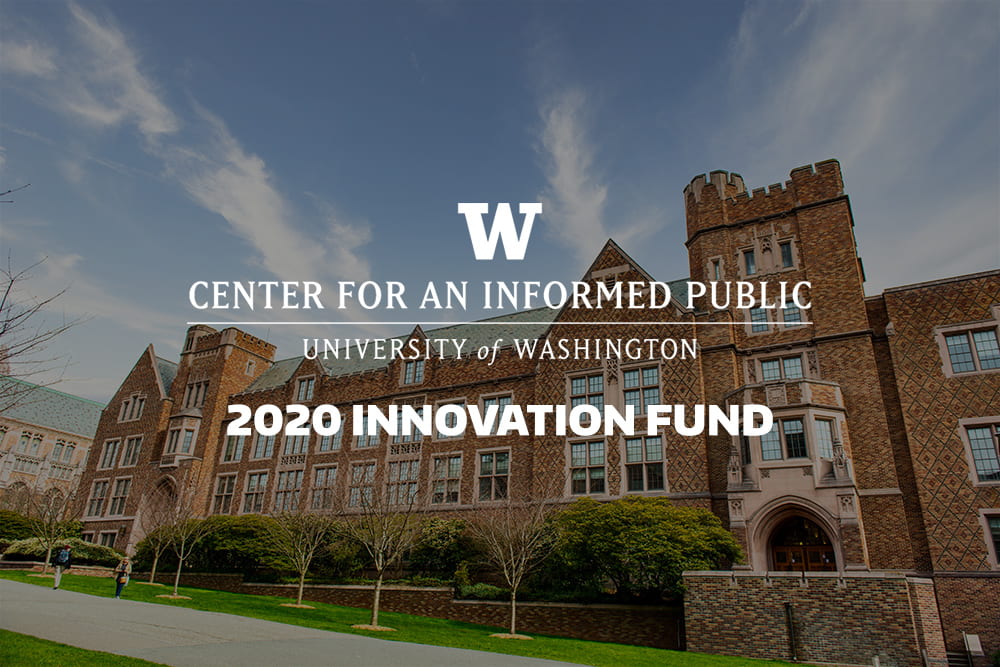This fall, the Center for an Informed Public awarded 2020 Innovation Fund grants to seven proposed projects, funding that will help support collaborative, multi-disciplinary, and timely projects intended to advance the CIP’s mission to resist strategic misinformation, promote an informed society and strengthen democratic discourse. The Innovation Fund is intended to seed promising new ideas and generate proofs-of-concept. Award amounts average around $10,000 and project periods are 6-12 months.
The CIP’s Innovation Fund grants wouldn’t be possible without the generous financial support of the John S. and James L. Knight Foundation and the University of Washington’s Technology & Social Change Group (TASCHA).
This year’s grantees include an online misinformation escape room, research into how misinformation spreads within pop music fandom and how anti-science narratives take hold of certain communities.
A full list of the seven 2020 grantees and their proposed projects is below:
Investigating Problematic Content in Political Web Ads Around the 2020 Election
- Franziska Roesner, Associate Professor, University of Washington Paul G. Allen School of Computer Science and Engineering; CIP Faculty
- Tadayoshi Kohno, Professor, Allen School
- Eric Zeng, PhD Candidate, Allen School
Summary: In this project, we propose investigating problematic content and techniques specifically in political web ads around the November 2020 U.S. election. This work will contribute to our broader research efforts providing a systematic understanding of problematic content in online ads and helping improve the quality and authenticity of content that users encounter online.
Q-Anon, #SaveTheChildren, and the Lamestream Media: Exploring How Narratives of ‘Under-reporting’ Fuel the Spread of Conspiracy Theories
- Rachel E. Moran, CIP Postdoctoral Researcher, UW Information School
Summary: The proposed project looks to uncover how topics become classified as “under-reported” by different publics and how this label is being weaponized to aid the spread of disinformation and conspiracy theories. In doing so, this project explores changing notions of professional journalism specifically regarding its gatekeeping role. Moreover, it questions supporters of the QAnon hijacked #SaveTheChildren campaign to understand why certain publics believe topics are “underreported” and how alternative information-seeking behaviors are constructed to overcome perceived absences within mainstream media.
Investigating Mask Narratives Shifts in the Anti-Vaccine Community Online
- Kolina Koltai, CIP Postdoctoral Researcher, UW Information School
Summary: This project aims to understand how the anti-vaccination community made a drastic shift in opinion on masks and face coverings, particularly during a pandemic. Understanding the anti-vaccine community’s response to anti-mask narratives can elucidate how anti-science narratives gain traction in certain communities and potentially how these tactics could be used to encourage pro-mask behavior. In addition, this study will investigate how those narratives were disseminated into these communities which will inform on the spreaders of vaccine disinformation and how that content gets created.
Fandom and Mis/Disinformation
- Emma Spiro, Assistant Professor, UW Information School; CIP Co-founder and Principal Investigator
- Jin Ha Lee, Associate Professor, UW Information School
Summary: This project aims to better understand how misinformation spreads and impacts social media users in the context of fandom in popular culture. Through a mixed-method approach employing virtual ethnography, interviews and analysis of social media data, we will identify self-reported strategies for addressing and countering misinformation among fandom members and trace the flow of misinformation among fandom networks on social media to better understand the impact of misinformation among the fans, as well as effective strategies for combating it.
Misinformation Escape Room
- Chris Coward, Senior Principal Research Scientist, UW Information School; CIP Co-founder and Principal Investigator
- Jin Ha Lee, Associate Professor, UW Information School
Summary: The overall objective of this project is to develop an online escape room as a novel educational approach to helping people learn about misinformation. We hypothesize that an escape room, designed around a fictional theme and hosted by public libraries as trusted institutions, offers an effective and innovative approach to building awareness about how misinformation works, and changing people’s information behaviors when encountering problematic information.
Calling Bullshit: Case Studies from COVID
- Carl Bergstrom, University of Washington Department of Biology Professor and CIP Faculty Member
Summary: With postdoctoral training in infectious disease epidemiology and expertise in tracking social media misinformation, PI Bergstrom has been a leading public figure in the fight against COVID misinformation and disinformation, in the national news on a daily basis during the pandemic. This proposal is to develop a set of case studies for the Calling Bullshit project that explore key lessons from the book and course, using prominent examples of COVID falsehoods.
A Digital Laboratory for the Study of Online Misinformation
- Joseph B. Bak-Coleman, CIP Postdoctoral Researcher, UW Information School
Summary: In this project, we hope to augment observations and theory by creating an experimental laboratory to study aspects of online sharing behaviour. The laboratory will consist of an online game in which participants choose news stories to share with other players. Players will receive a bonus when their stories get reshared. This experiment will allow us to explicitly control how players interact with one another and the information they see.




